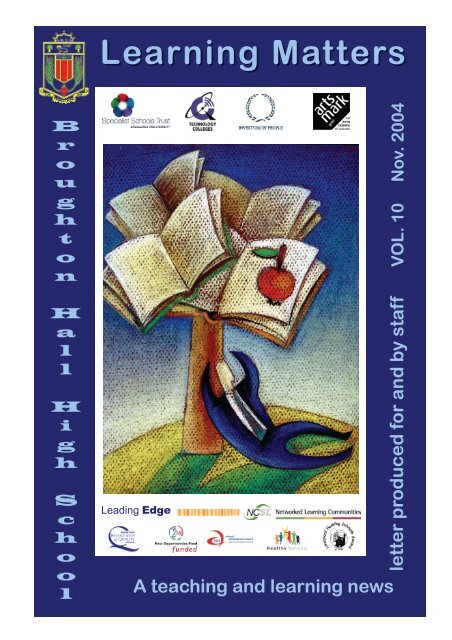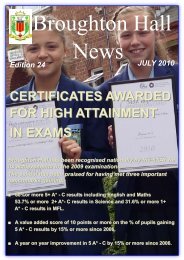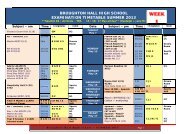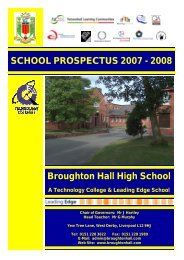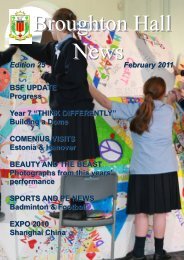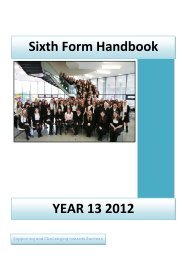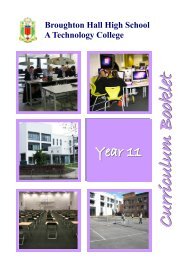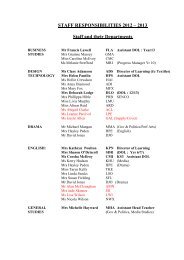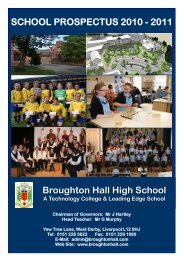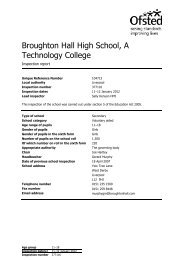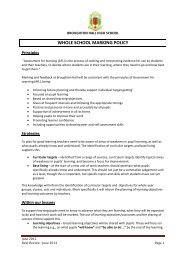Learning Matters - Broughton Hall High School
Learning Matters - Broughton Hall High School
Learning Matters - Broughton Hall High School
- No tags were found...
You also want an ePaper? Increase the reach of your titles
YUMPU automatically turns print PDFs into web optimized ePapers that Google loves.
Book of the Term<strong>Broughton</strong> <strong>Hall</strong> <strong>High</strong> <strong>School</strong>Becoming Emotionally Intelligentby Catherine CorriePublished by Network Educational PressIn the foreword to this book, Catherine Corrie writes: “children do notexpect us to be perfect and never make mistakes, but they have littletolerance of hypocrisy, so whatever we are asking of them, we must beprepared to ask more of ourselves.”This very clearly written book goes on to explore Catherine Corrie’s ownjourney of understanding in relation to the importance of developing anunderstanding of what is meant by the term emotional intelligence, how important that understanding is tothe shaping of effective relationships with pupils and the development of practical tools and teacherconfidence in order to put that understanding into practice.An understanding of the significance of emotional intelligence is important in the further development ofan awareness of what is meant by personalized learning. As Corrie says: “Our personality or ego ismade up of our emotional, physical and mental bodies and everyone has a unique combination of these.”The book begins with an exploration of the theory of E.I. with a brief summary of recent research whichindicates that E.I. shapes as much as 70-80% of success. Reference is also made to those ‘pupil smarts’ ofinter- and intra-personal intelligence.Corrie offers a three part model to aid the understanding of E.I.:1. Know ourselves2. Make choices3. Make a positive difference to the world around us.Summed up in the words of Gandhi as, “Be the change you want to see in the world.”Subsequent chapters explore this three part model, referring to the internal and external environment, howto understand and manage behaviour—and in line with whole brain learning a chapter on the importanceof the limbic system. Each chapter is sprinkled with anecdotal case studies, self review exercises,diagrams (for the visual learner) and a range of interesting and relevant quotes from a range of greatthinkers.This is a though provoking book as chapters on self esteem and pessimism and optimism point to theinfluences that teachers have on the E.I. development of children in their care.Concluding chapters offer a range of activities to aid the development of E.I. and motivation.Clearly written from a common sense and practical view, this is a very helpful introductory guide to thisvital area of understanding of E.I. and the significance of the role of the teacher is best summed up by oneof the many quotations sprinkled through the book:“Some people say they haven’t yet found themselves. But the self is not something one finds:it is something one creates.” Thomas SzaszIf you require further information about emotional intelligence, please see Kevin Lynn who leads on thisarea for the West Derby Networked <strong>Learning</strong> Community.Anyone who wishes to access a copy of this book, please see Margaret Grant.Ged Murphy<strong>Learning</strong> <strong>Matters</strong>Page 3
<strong>Broughton</strong> <strong>Hall</strong> <strong>High</strong> <strong>School</strong>www.emagine.org.uks a new recruit to teaching I thoroughly enjoyed attending the NQT Induction ProgrammeA run by Liverpool LEA. Whilst continuing my professional development the real highlightwas the opportunity to catch up with colleagues from my PGCE.After one session I spent a pleasant coffee break with Sarah Hoggard, an NQT from John Bosco,and Margaret Grant from <strong>Broughton</strong> <strong>Hall</strong>, who was presenting a session on accelerated learning.During the chat, which inevitably got round to the teaching of textiles, we discussed how to keeppupils motivated for the 40 hour coursework project that results in 60% of the pupils final grade.Margaret had recently attended a presentation discussing methods by which students could beempowered with technology, citing evidence that pupils are motivated by an authentic audiencefor their workThe idea for a website, as joint venture for both schools had been conceived.The home page states our aim. em@gine.org.uk is a web site designed to raise achievement forall in textile technology. The site will empower pupils to take responsibility for their ownlearning and provide a showcase for the celebration of their success. We wanted a visually strongsite to display the talents of the pupils and involved the skills of MGL to build the site. Throughoutthe process, students and staff have been involved in selecting all aspects of the site; thename, playing on the Liverpool/John Lennon connection, the 1970s colours and feel and thecommentary.Both teachers selected one year 11 group whose work is represented on the site.As the coursework has been an ongoing process throughout the autumn and spring terms so tohas the development of the exemplar material displayed on the web site. Pupils and parents etccan now view the work on the web site. The pupilsinvolved in the project have thus gained “the realaudience”.Where do we go from here?There is some tying up of loose ends to ensure all areasof the pupils’ coursework are displayed on the web site.<strong>Broughton</strong> <strong>Hall</strong> had a fashion show at the end of Junewhich may result in some moving images that can bedisplayed on the site. In addition we need strengthenlinks to relevant web sites so that pupils can accessthese during their projects. The intention is that the site can be used to help pupils starting theircoursework for submission in April 2005.Mark II of the web site is in the idea stage. The aim of the website development is to give pupilsresponsibility for their own learning with the incorporation of a bulletin board. The bulletinboard, accessed by pupils from each school via a password, would give pupils the ability to askand give each other, their peers, advice on all areas of their coursework.The site is now live, why not give it a visit on www.emagine.org.uk<strong>Learning</strong> <strong>Matters</strong>Page 4Clare Adamson
<strong>Broughton</strong> <strong>Hall</strong> <strong>High</strong> <strong>School</strong>News from Archbishop BlanchThe Teaching and <strong>Learning</strong> journey has begun. Well, it actuallybegan many years ago but without such a co-ordinated approach!!I started the temporary post as Teaching and <strong>Learning</strong> Co-ordinator inMay 2004 not really knowing exactly where to begin. Five months later and with muchappreciated support from Sue Clarke and Margaret Grant, Archbishop Blanch <strong>School</strong> isnow raising awareness to help our pupils become better and more independent learners.Alongside this, we are supporting staff, I suppose as we have always done, to help themraise their standard of teaching from what is already a very good starting point. In a relativelyshort period of time, I have implemented initiatives suggested by <strong>Broughton</strong> <strong>Hall</strong>,teaching friends and colleagues as well as using some of my own ideas.Our school now has the plans in place to develop teaching and learning over the next 3years. To date, I’ve co-ordinated the refurbishment of the library to transform it into a<strong>Learning</strong> Centre and Library - our school was desperately in need of a study areaparticularly for our growing Sixth Form. Our ASTs are working closely with staff andpupils, providing workshops and additional lesson preparation support for staff. We’recurrently assessing the learning styles of all pupils using a computerised programme. Theresults of these assessments will be given to all teaching staff before Christmas. Inaddition, we’ve raised the profile of teaching and learning through staff bulletins, FormTime and display. Our pupils have responded very positively to this initiative and arekeen to learn more about the way in which we learn.On the whole, our staff have also been very responsive and are trying out some of theideas presented to them. There will always been a handful of staff, in any school, whoare not as open to ’new’ initiatives as others. Many of the ideas within teaching andlearning are not new, however; they have simply been remodelled - it doesn’t hurt us tobe reminded ‘now and again’ about how we can encourage our pupils to become betterlearners. The majority of us can also class ourselves as good learners and teachers.What’s wrong, however, with trying to be better or trying new ideas with a class or pupilwho may have difficulty with learning and, as a consequence, behaviour?My role ends in December, when we have appointed a new Deputy Head Teacher whowill hopefully continue the work that I and our staff have begun. I started the role asTeaching and <strong>Learning</strong> Co-ordinator not really knowing what impact our work wouldhave. In a short time, I can already see some impact, if only small at the moment.I firmly believe that a co-ordinated approach over the next three years and beyond willraise our standard of teaching and learning, engaging staff and pupils alike.Finally, I would like to thank <strong>Broughton</strong> <strong>Hall</strong> sincerely for their support and for sharingtheir good, if not excellent, practice with Archbishop Blanch <strong>School</strong>.Sue Jones<strong>Learning</strong> <strong>Matters</strong>Page 5
<strong>Broughton</strong> <strong>Hall</strong> <strong>High</strong> <strong>School</strong>Teaching for <strong>Learning</strong>Developing a <strong>Learning</strong>-Centred Classroomby Dave Vizard—30 th Junerawing on his own varied experience of 30 years as a teacher and more recently a trainer,D Dave Vizard gave a lively summary of his vision of teaching for learning.Colleagues on the course came from a wide range of teaching establishments, all at verydifferent stages in the process of developing whole-brain/accelerated learning within theirschools. To that end, the course drew heavily upon scientific studies of the brain, the importanceof water and diet, as well as research into preferred learning styles and conducive classroomenvironments. Although as a school we are already very aware of much of this, it was a usefuland timely reminder of the solid theory that underpins what we are trying to achieve at<strong>Broughton</strong> <strong>Hall</strong>. It was also very comforting to realise just how far we’ve come in comparison toother schools.The delegates on the course were hungry for practical examples to illustrate what is meant bythe term “<strong>Learning</strong>-centred”, and Dave Vizard did not disappoint. Naturally, much of what headvocated was very familiar to us-the need to audit current practice, establish systems toidentify preferred learning styles and plan for them etc. Similarly, some of the examples oflesson activities are very familiar to us, drawing heavily on the work of Alistair Smith.What I’ve outlined below are some of the more novel tips and good ideas he passed on, as wellas his take on the key issues facing schools today.STARTERS“Tearing Off A Strip”- to consolidate previous learning and connect to new informationDisplay relevant key words/vocabulary on a white board. Ask students to write down any 6 to 8words from the list.Teacher reads out words at random. If a student has that word on the top or bottom of their list,they can tear it off.The first person to tear all their strip wins.For a more demanding alternative, give the MEANING of the key words only.TEARING OFF A STRIPRIA SPIT CONFLUENCEESTUARY TOMBOLA LBPCLIFF BAY LONGSHORE DRIFTBEACH HEADLAND CUSPRAISED BEACH CAVE NOTCHGROYNE WAVE BARCURRENT PEBBLES TIDE<strong>Learning</strong> <strong>Matters</strong>Page 6
<strong>Broughton</strong> <strong>Hall</strong> <strong>High</strong> <strong>School</strong>“SPLAT”- A lively game involving teams of pupils armed with fly swatters!Answers (necessarily short) are displayed on whiteboard/OHP.One person from each team comes to the front of the room and are given fly swatters. (Pupilstake turns).Teacher asks questions and pupils “splat” the correct answer on the board.SPLATGOLDIE HAWN ROGER MOORE TITANICPINEWOOD STUDIOS 39 STEPS CLINT EASTWOODGEORGE LAZENBY CASINO ROYALE QKATE BECKINSALE ALFRED HITCHCOCK STEVE MARTINPETER SELLERS KATE WINSLET CARRIE FISHERSTEVEN SPIELBERG PEARL HARBOUR MCATHERINE ZETA JONE GEORGE LUCAS HELEN MIRRENCONSOLIDATING ACTIVITY“Calling Cards”- to test pupil understanding and inform teachingEvery student responds to statements made by teacher about the content of previous lesson/s.Each student holds up a card with a TICK, CROSS or QUESTION MARK to show whether theyunderstand statements made by teacher.DEMONSTRATING ACTIVITY“One–to–One”- allows pupils to show what they knowDivide class into 2 halves and divide topic area in 2.Each pupil is expected to produce their own visual aid summarising their topic.Pair students across the 2 halves. Students explain their half of the learning to the other.CO-OPERATIVE LEARNING ACTIVITIESEach of the two approaches outlined below are designed to increase learning, level ofchallenge, involvement and ownership. It is learning by “doing”, should be fun and givespupils clear roles and responsibilities.Approach ADivide room into 6 information points on a topic - Suggestions are a book point, computers, roleplayarea, leaflets and posters, teacher in role for Q & A.Each group sends a student to each area to gain information required by task.Each group is given a Must/Should/Could Do list.Each group to produce report/presentation at end.<strong>Learning</strong> <strong>Matters</strong>Page 7
<strong>Broughton</strong> <strong>Hall</strong> <strong>High</strong> <strong>School</strong>Approach BDivide class into teams.Different documents are given to different team members.Each team to have a Project Manager, Vocabulary Chief, Scribe, “Work Ants” and <strong>Learning</strong>Checker (to ensure all team members can EXPLAIN their learning).Pupils quizzed about findings from documents.Teams evaluate performance-how could they improve next time ?Reasoning, Word and Letter play.USEFUL WEBSITEShttp://www.adders.org/freeware/ - Some useful free software, including a Jigsaw maker,Hangman, Crossword maker, Everlasting Maths worksheet, Sentence Builder etc. There are lotsof possibilities-check out the potential use in your subject area.http://school.discovery.com - A good online teachers guide, including a brilliant“Brainboosters” section which has tasks on Categorization, Lateral Thinking,www.homeworkelephant.co.uk - Source of information on most subjects. Lots of quizzes andpuzzles.THE KEY ISSUES FACING SCHOOLS TODAY – WHAT NEEDS TO BE DONE• Establishing environments which empower students to learn• Implement and enforce assessment for learning practices.• Be open to changes in the school curriculum, which would have a sharper focus onlearning and skills development.• Recognise and plan for gender differences in schools, without NEGLECTING the needs ofGIRLS!• Be willing to challenge the accepted norm, to take risks in our classrooms.• Swapping that feeling we’ve all experienced of “Teaching without <strong>Learning</strong>” for one of“<strong>Learning</strong> without Teaching”.Dave Vizard recognises that, for a large number of students, school is low down on a listof competing priorities, but by creating the the “<strong>Learning</strong> Centred Classroom”, we cango a long way to eliminating the RHINO.Really Here In Name Only<strong>Learning</strong> <strong>Matters</strong>Page 8Sarah Frost
Talk RulesTeach Outside YourBox2nd <strong>Learning</strong> Together ConferenceFriday 11th February 2005Mysterious MathsProgrammeTime Activity Venue8:30 RegistrationBH = Resource AreaCH = Junior EntrancePP = Main EntranceCoffee<strong>Hall</strong> & Dining Room9:15 Welcome by Ged Murphy Dance Drama Studio9:30 - 10:15 Keynote Speaker - Vivienne Dance Drama StudioBaumfield, Director ofThinking Skills ResearchCentre, University ofNewcastle10:15 - 10:45 Coffee / Exhibition <strong>Hall</strong>, Dining Room & SixthForm Common Room10:45 - 12:15 Workshop A Various12:15 - 1:15 Lunch / Exhibition <strong>Hall</strong>, Dining Room & SixthForm Common Room1:15 - 2:45 Workshop B Various2:45 Evaluation Dance Drama Studio3:00 What Next? Dance Drama Studio3:15 End of Conference DepartureThinking for<strong>Learning</strong>Aromatherapy forStressed TeachersInteractive ThinkingSkills
West Derby Networked <strong>Learning</strong> CommunityJoint INSET Day – 2nd <strong>Learning</strong> Together Conference – Friday 11 February 2005Workshop Leader Planning ProformaCONTACT DETAILSName:___________________________________________________________________Address:______________________________________________________________________________________________________________________________________Tel. No._______________________________ Fax. No. ____________________________E-Mail Address:___________________________________________________________________Dietary Requirements: ___________________________________________________________________WORKSHOPTitle:___________________________________________________________________Workshop Resumé (approx. 50 words): _______________________________________________________________________________________________________________________________________________________________________________________________________________________________________________________________________________________________________________________________________________________________________________________________________________________________________________Suitable for: 1. Secondary Primary Both 2. Introductory Developmental REQUIREMENTSICT/Other?____________________________________________________________________________________________________________________________________Room Layout?Other:___________________________________________________________________________________________________________________________________________________________________________________________________________________________________________________________________TO BE COMPLETED AND RETURNED BY3RD DECEMBER 2004.THANK YOU
<strong>Broughton</strong> <strong>Hall</strong> <strong>High</strong> <strong>School</strong>Thinking is Critical!his year, the school is running an AS level Critical Thinking pilot with aT selected group of students during general studies and key skills time. I havebeen given the opportunity to plan and deliver the course. The end of the firsthalf-term seems like a good time to report back on how things are progressingand to inform those unfamiliar with what the course entails.Critical Thinking as a discrete subject was introduced by OCR as an AS level in2000. The idea behind the course is to provide students with a toolkit forbreaking down, understanding, analysing and criticizing arguments. There is nocontent as such; the students practise the skills and learn vocabulary that helpsthem to describe the shape of an argument and the faults that might exist withinit. The materials we use come from a wide range of sources, promoting transferacross the curriculum.The qualification is increasingly recognised in higher education. The examreflects the format of many of the new entry exams introduced by universities,giving students the edge if they have to take one.Our first half-term has been spent learning the basics of critical thinking. Wehave been identifying reasons and conclusions in arguments and mapping them,finding hidden assumptions in arguments to decide if they are weak or strong andlearning how to assess credibility. The approach has to be gentle at first. Thestudents could easily be put off if they do not get a simple introduction to a way ofthinking they may not have experienced before. We have engaged in lots ofdiscussion and used kinaesthetic activities to explore aspects of the course.Logo-visual aids (magnetic hexagons!) have been useful in deconstructingarguments. Feedback so far has been largely positive, and the girls havedemonstrated a real aptitude in understanding and using the tools we arelearning about.Contd...<strong>Learning</strong> <strong>Matters</strong>Page 11
<strong>Broughton</strong> <strong>Hall</strong> <strong>High</strong> <strong>School</strong>Why not try a couple of Critical Thinking questions?There are as yet no signs of a revival in the housing market,despite what one reads in the papers. There are houses in ElmStreet that have been up for sale for over two years, and notone of them has been sold.Which of the following is the best statement of the flaw in the argument above?ABCDIt assumes that the papers are giving the correct information about thestate of the housing market.It implies that there would be evidence of a revival in the housing market ifone of the Elm Street houses had been sold.It offers no evidence to support the conclusion that the housing market is notreviving.It draws a general conclusion about the housing market from a particularcase of houses that have not been sold.Many people in our society are growing increasinglyaddicted to computer games. Challenges presented ingames can often seem of greater relevance than thosefound in real life, and can be solved far more easily thanthe real life dilemmas which the player may face. You areable to forget your problems completely, as you becometotally absorbed in the game. Thus computer games can be used toprovide an escape, and are a far better way of forgetting your worries thanthrough the use of alcohol and drugs.Which one of the following is an underlying assumption of the argument?ABCDAddiction to computer games is less harmful than addiction to alcohol ordrugs.It is better to face up to one’s problems than to try and find some sort ofescape.Solving problems in computer games prepares us for the ones we willmeet in real life.Some problems in life are too difficult to be solved so it is better to escapefrom them.Daniel Penn<strong>Learning</strong> <strong>Matters</strong>Page 12
<strong>Broughton</strong> <strong>Hall</strong> <strong>High</strong> <strong>School</strong>THE PUPIL PERSPECTIVEParticipating in numerous Inservice Days has greatly benefited me. I havehad the opportunity to be actively involved in the school’s continuingdevelopments in the field of whole brain and personalised learning. Myselfand three other students have, on many occasions, embarked on visits to variousschools and locations to present our own personal findings on learning. Within apresentation, we give examples of how learning techniques have beenencountered and introduced by staff, and how it has aided us in our studies.For example, I specifically talk about the use of music in the classroom. AtGCSE, Nicola Maloney and myself produced a song based upon life in thetrenches. The song created a positive effect in the classroom, where the groupwere very enthusiastic to learn. We then had the opportunity to record the song,something which has haunted us every since! Throughout this experience, Ihave learnt the value of applying your own preferred learning technique and thisis something I adopt in almost all of my lessons. The song alone did not help meachieve my final GCSE grade, but it did certainly aide my revision and enhancedmy enjoyment of History as a subject.I was especially eager to meet Barbara Prashnig, the famous New Zealander,who specialises in learning techniques. Emma Kelly and myself had the chanceto do so. Over lunch and a tour of Liverpool, it was extremely interesting to hearher opinions on learning.I was also fortunate to attend the DfES Leading Edge Conference in London inthe summer. Emma Kelly and myself contributed to a presentation by Mr Penn inwhich we talked about personalised learning and its effects on us individually.The knowledge of your preferred learning style is something which I feel is agreat advantage as a pupil. You are able to use this knowledge to enhance yourperformance in subjects and it can, as I have personally found, greatly improverevision. At the conference, we were able to ask David Milliband a question onemotional intelligence and his answer seemed very long winded. We alsomanaged to fit in some sightseeing and even a drink with MP Louise Ellman inthe Strangers Bar at the House of Commons.My involvement in these events has been extremely rewarding. They have givenme the chance to improve my own learning methods and have put a far moreinteresting spin on how pupils should be educated. I have learnt that to place theemphasis on the pupil individually is most effective.Leanne Sibbald<strong>Learning</strong> <strong>Matters</strong>Page 13
<strong>Broughton</strong> <strong>Hall</strong> <strong>High</strong> <strong>School</strong>CONGRATULATIONS TO:-Ron Kirby - TechnologyTony Haimes - MathsMargaret Canny - R.E.Jacinta McGowan - MathsSue Clarke - P.E./R.E.Judy Dadswell - ScienceHelen Tickle - PsychologyLinda Stocks - EnglishJoanne Spike - R.E.Margaret Grant - History/HealthCarol Carlisle - MathsPauline Whelan - MFLAnne Roberts - ICTwho successfully completed instruction in the de Bono’s Six ThinkingHats ® technique during the Summer Term of 2004.Six Thinking Hats are now available for use in “The Room” (C6). Inthe meantime, if you would like to know more about Six ThinkingHats, why not speak to one of the de Bono Group.Margaret Grant<strong>Learning</strong> <strong>Matters</strong>Page 14
<strong>Broughton</strong> <strong>Hall</strong> <strong>High</strong> <strong>School</strong>TBuddies in Bluehe Buddies Programme is up and running at <strong>Broughton</strong> <strong>Hall</strong> thanks to the dedicationand enthusiasm of the Buddies themselves. There are currently 37 Year 10 studentswalking around with small blue badges on their blazers and this is just a hint ofwhat they have helped to create and will develop at <strong>Broughton</strong> <strong>Hall</strong> over the next year.Wearing the badges they helped to design, and, armed with message books for the lessconfident Year 7’s, the Buddies visit their Year 7 classes every Tuesday morning to talkthrough their concerns or simply to chat with them and the response has surprised everybodyinvolved. The Year 7’s seem to have accepted the Buddies as their own: they writefreely and chat informally to them. The Buddies then diligently give up their free timeduring break to read and reply to the messages. Several of them have even visited duringafternoon registration to follow up on their visits. This is the type of dedication thathas amazed me and made me extremely glad to have chosen Year 10 to help pilot the programme.I will admit that we have met some obstacles along the way. The change of lunch hourmeant that we decided to meet after school which is not ideal for those taking publictransport and studying various subjects after school, but the Buddies were willing to giveit a go until Mrs. Fox saved the day. She suggested a visit during registration, whichhelped everyone involved to make the visit a regular one.<strong>Learning</strong> <strong>Matters</strong>Page 15
<strong>Broughton</strong> <strong>Hall</strong> <strong>High</strong> <strong>School</strong>Mrs. Fox and Mrs Lodge have been extremely supportive of the programme and havemade so many helpful suggestions I can’t list them, but the real stars are the Buddiesthemselves who have demonstrated great maturity and dedication.I have high hopes for this programme and plan to develop it further this year. I will takea course by NMN later this term to really grasp the methodology behind peer mentoringand I would like to make things official by applying for approved provider status nextyear. It’s a long way from the initial idea entering our heads in Montréal and there issome way to go yet, but I am sure it will be worthwhile.Susan Owens<strong>Learning</strong> <strong>Matters</strong>Page 16
<strong>Broughton</strong> <strong>Hall</strong> <strong>High</strong> <strong>School</strong>KEYWEBSITESMathswww.mathworld.wolfram.comAn exhaustive mathematical resource, assembled over more than a decade by Eric W.Weisstein with assistance from leading mathematicians throughout the world.www.nrich.maths.orgPart of the Millennium Maths Project (MMP), this site offers free mathematics enrichment resources (puzzles,problems, investigations, games) for ages 5 to 19.www.teachernet.gov.ukA government website designed to support teachers in the effective delivery of numeracy lessons. The siteincludes lesson plans, guidance, advice and extensive support for continuing professional development.www.woodlands-junior.kent.sch.uk/teacher/maths.htmlWoodlands Junior <strong>School</strong> in Kent hosts its own website. The site covers all curriculum subjects, includingnumeracy, and offers a wealth of resources and lesson plans.www.teachingandlearningresources.co.uk/teachingnumeracy.shtmlCreated by Diane Hawkins, a teacher with 17 years’ experience across Key Stage 2, this site offers links to theNational Numeracy Strategy, interactive resources, lesson plans and other support material.www.statistics.gov.ukThe home of National Statistics online, this site offers access to an almost unlimited supply of data that can be usedwithin mathematical investigations. All of the statistics reflect Britain’s economy, population and society atnational and local level.www.ltscotland.org.ukFrom <strong>Learning</strong> and Teaching Scotland, the numeracy area on this site supports students, teachers, schools,authorities and parents in working to improve numeracy. It makes available resources, case studies, reports,research papers and links to educational websites. It also provides information about new initiatives and events tosupport improvement in numeracy.Sciencewww.azteachscience.co.uk/code/development/early_years/index.htmFrom the AstraZeneca Science Teaching Trust, this site contains case studies, guidance andinformation on how to effectively integrate science into the Foundation Stage.www.darvill.clara.netThis site contains lots of free material written by Andy Darvill, Science/ICT teacher at Broadoak Community<strong>School</strong>, Weston-super-Mare. Full of ideas for lessons, downloads, information about other software and revisiontips this is an excellent site produced with the classroom in mind.www.ase.org.ukFrom the Association for Science Education (ASE), this site offers a range of information and resources for allscience teachers.www.woodlands-junior.kent.sch.uk/teacher/science.htmlWoodlands Junior <strong>School</strong> in Kent hosts its own website. The site covers all curriculum subjects, including science,and offers a wealth of resources and lesson plans.www.psigate.ac.uk/newsitePSIgate is a free service that offers access to high quality resources in the physical sciences; there are currently11229 resources in astronomy, chemistry, earth sciences, materials sciences, physics and science history and policy.www.edit.legend.yorks.com/science.htmlPacked with information, activities and pictures, this site offers links to hundreds of activities to support theteaching of science at primary level.<strong>Learning</strong> <strong>Matters</strong>Page 17
<strong>Broughton</strong> <strong>Hall</strong> <strong>High</strong> <strong>School</strong>Science (contd.)www.nasa.govA truly amazing site full of photographs, video footage and information to support the teaching of science -especially topics covering the Earth, Sun and Moon.www.mhs.ox.ac.ukFrom the Museum of the History of Science in Oxford, this site contains thousands of scientific images that can beprojected or printed for use in science lessons. The site also offers a range of virtual exhibitions that can beaccessed easily and quickly.Literacywww.teachernet.gov.ukA government website designed to support teachers in the effective delivery of literacy lessons.The site includes lesson plans, guidance, advice and extensive support for continuingprofessional development.www.warwick.ac.uk/staff/D.J.WrayThis site has been developed and produced by David Wray, Professor of Literacy Education at the Institute ofEducation, University of Warwick. The site is designed to help further the study and teaching of literacy andliteracy learning, and includes research and guidance on a range of topics.www.woodlands-junior.kent.sch.uk/teacher/english.htmlWoodlands Junior <strong>School</strong> in Kent hosts its own website. The site covers all curriculum subjects, includingliteracy, and offers a wealth of resources and lesson plans.www.literacytrust.org.ukThis site is hosted by the National Literacy Trust, an independent charity dedicated to building a literate nation.The site offers a range of support, initiatives and information for all literacy professionals.www.ncll.org.ukThe National Centre for Language and Literacy (NCLL) supports teachers, parents and governors in a variety ofways. This website offers a range of resources, courses, research reports and support.www.nate.org.ukThis site is from the National Association of Teachers in English (NATE), which is a professional associationfounded to support teachers of English. It offers a range of resources, support materials and advice.www.literacyhour.co.uk/index.htmlThis interactive site is full of lesson plans, homework sheets, reading activities and much, much more. Some of theactivities could be projected through an interactive whiteboard, while others could be downloaded and printed offfor whole-class distribution.http://curriculum.becta.org.ukAs part of the National Grid for <strong>Learning</strong>, this site is produced by Becta. With lesson plans, case studies, adviceon literacy issues, research reports and up-to-the minute information on new initiatives for literacy. This site iswell worth a visit!Foundation Subjectswww.becta.org.ukAs the leading government body for information and communication technology ineducation, Becta aims to further its use to raise educational standards and improveeffectiveness.www.geography.org.ukWith almost 10,000 members, including teachers in all phases, the Geographical Association’s mission is to furtherthe teaching of geography and communicate its value to education.<strong>Learning</strong> <strong>Matters</strong>Page 18
<strong>Broughton</strong> <strong>Hall</strong> <strong>High</strong> <strong>School</strong>Foundation Subjects (contd.)www.world-faiths.comA website devoted to providing information on the religions of the world for secondary schools. Buddhism,Christianity, Hinduism, Islam, Judaism and Sikhism are all covered.www.naace.orgNaace is a professional association for those concerned with advancing education through the appropriate use ofICT, and the key influential professional association for ICT in education.www.mfy.org.ukMusic for Youth is an educational charity with a worldwide reputation for its work in music education, providingfree access to educational and performance opportunities for young musicians.www.data.org.ukDATA (Design And Technology Association) is the recognised professional association that represents all thoseinvolved in design and technology education and associated subject areas, promoting, developing and maintainingall branches of D&T education.www.history.org.ukThe Historical Association aims to further the study, teaching and enjoyment of history at all levels by providingresources, supporting life-long learning and campaigning for history.www.cilt.org.ukThe National Centre for Languages works to produce a comprehensive programme of conferences and trainingevents for classroom teachers across all sectors of language teaching.Thinking Skillswww.scre.ac.uk/scot-research/thinkingA summary of a discussion paper reviewing the published literature on thinking skills. Thecomplete text of this paper is also available in PDF format from this page.www.nwrel.org/scpd.sirs/6/cull.htmlA summary of research and main principles of various thinking skills approaches. Quite a comprehensivedocument.www.standards.dfes.gov.uk/thinking skillsInformation for classroom teachers working in primary schools in the UK about thinking skills programmes andapproaches that are currently available.www.newhorizons.org/strategies/thinking/perkins.htmA very useful article by David Perkins on how to start drawing the attention of pupils to their own thinking inorder to improve their learning.http://learnweb.harvard.edu/alsp/thinking/infor_articles.cfmThe Thinking Classroom is based on the collective research and ideas of the Cognitive Skills Group, HarvardProject Zero. Topics cover thinking dispositions., the transfer of learning.www.thinkingtogether.org.ukSite on classroom talk to develop thinking skills. Includes free software, details of recent publications and researcharticles for downloading.www.sapere.netMain organisation for Philosophy for Children (P4C) in the UK. Includes introduction to P4C, courses,conferences, recommended resources and links.http://cehs.montclair.edu/academic/iapsThe IAPC is the home of Philosophy for Children. This site introduces the main concepts and the originalprogramme.<strong>Learning</strong> <strong>Matters</strong>Page 19
<strong>Broughton</strong> <strong>Hall</strong> <strong>High</strong> <strong>School</strong>COURSES FORTEACHERSFor further information or to book a place please see Margaret Grant.N.B. LEAVE OF ABSENCE WILL NEED TOHAVE BEEN AGREED BY GED MURPHYDEVELOPING PUPILS AS RESEARCHERS KS2-3A one-day seminar on how to develop critical and creative thinkingthrough original researchLed by Dr. Mary Kellett (Seminar Code TT05)INTRODUCTIONAt a time when many teachers are frustrated by the lack of opportunity for pupils to engage increative and in-depth learning, the idea of pupils undertaking their own original research is awelcome initiative. It can be harnessed to Gifted and Talented programmes, extra-curricularactivities (such as the setting up of research clubs) and to strategies designed to re-engagedisaffected learners. Pupils show more motivation when their learning includes an element offree choice and ownership. Some of the beneficial outcomes for pupils include the developmentof organisational skills, information management skills, communication skills, critical thinkingand creativity. Equally important are aspects of self-development such as increased confidenceand self-esteem and a positive attitude towards learning.BENEFITSAt the end of the day, delegates will have:• Explored practical ideas for pupil activities and teaching sessions.• Reflected on how the process of researching can extend pupils’ learning.• Reflected on the nature of research and its common characteristics.• Considered ways to distil and differentiate the complexity of research methodology to makeit accessible for pupils.• Learned some data-collection and analysis techniques that are the most appropriate for use bypupils.• Considered the importance of research ethics.THE SEMINAR LEADERMary Kellett is Director of the Children’s Research Centre at The Open University where shealso lectures in the Faculty of Education and Language Studies. She has a background inprimary teaching and has undertaken pioneering research in the field of children as activeresearchers. She has published widely on this and other educational topics including additionaleducational needs, ethics and disaffection.SEMINAR DATE / TIME / VENUE29 November 2004 / 9:15 Registration - 16:00 End / BirminghamEdited by Margaret GrantPublished by Kim O’HarePrinted by Elaine Lawlor


